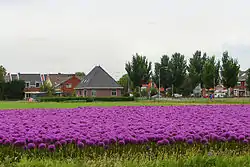Limmen
Limmen is a town in the Dutch province of North Holland. It is a part of the municipality of Castricum, and is situated about 9 km southwest of Alkmaar. Before 2002 it was a separate municipality.
Limmen | |
|---|---|
 | |
 Coat of arms | |
 | |
 The town centre (darkgreen) and the statistical district (lightgreen) of Limmen in the municipality of Castricum. | |
| Coordinates: 52°34′N 4°42′E | |
| Country | Netherlands |
| Province | North Holland |
| Municipality | Castricum |
| Area | |
| • Total | 1,270 ha km2 (Formatting error: invalid input when rounding sq mi) |
| Population | 6,817 (1 January 2,006) |
In 2001, the town of Limmen had 5602 inhabitants. The built-up area of the town was 1.2 km², and contained 2061 residences.[1] The wider statistical area of Limmen has a population of around 6860.[2]
History
Limmen has been mentioned in various documents since 750, by the name Limbon and later Limmen. It has seen prosperous times, but also times of struggle.
When the people of Limmen became more dependent on agriculture instead of trade at the beginning of the 15th century, the more wealthy moved away. For three centuries Limmen did not develop or grow, despite some efforts made to make the town more attractive. Around the year 1850 Limmen had only 450 inhabitants left.
Limmen was made more accessible in the late 19th century as an effect of the growing Dutch infrastructure, making Limmen a growing town. More work was created, especially by growing bulbs, which made Limmen the so-called "bollencentrum" (bulb-centre) of the northern part of Holland.
Flowerdays
The annual "Bloemendagen" (Flowerdays) are a tradition in Limmen in the month of May. People living there make mosaics with the flowers of the Hyacinthus orientalis and set up the mosaics in front of their house. People from around the Netherlands come to visit Limmen these days. Bloemendagen Limmen
The village also has a botanical museum, called Hortus Bulborum. This is a collection garden with it 4,000 spring-flowering historical bulbs. This collection consists primarily of tulips, narcissus and hyacinths, but there is also a small number of Fritillaria and crocus, primarily the C.vernus types. In addition to functioning as a gene bank, the garden has a seasonal display of thousands of heirloom bulbs, some of which are no longer in commercial production. Certain tulips originated in the 16th century.
References
- Statistics Netherlands (CBS), Bevolkingskernen in Nederland 2001 "Archived copy". Archived from the original on 2006-03-19. Retrieved 2007-01-24.CS1 maint: archived copy as title (link). Statistics are for the continuous built-up area.
- Statistics Netherlands (CBS), Gemeente Op Maat 2004: Castricum .
- 10th anniversary of Armenian and Dutch sister cities marked in the Netherlands
External links
- J. Kuyper, Gemeente Atlas van Nederland, 1865-1870, "Limmen". Map of the former municipality, around 1868.